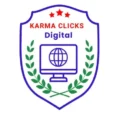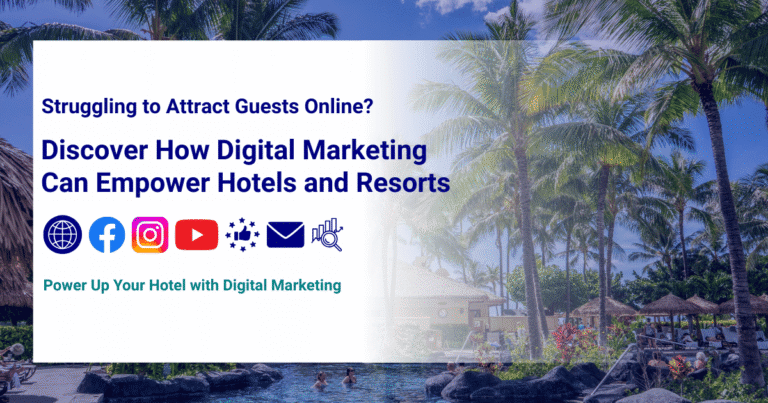
Learn how digital marketing for hotels and resorts helps overcome low bookings, OTA overdependence, and online invisibility with simple, actionable solutions.
Table of Contents
ToggleIntroduction
In today’s competitive hospitality landscape, digital marketing can empower hotels and resorts like never before. With travel rebounding strongly after the pandemic, guests are no longer just booking rooms—they’re booking digital experiences. From Google searches to Instagram inspiration, the travel journey now starts online.
This shift is especially crucial for small and medium-scale hotels and resorts in India. While the big brands have entire teams managing digital presence, many independent properties still rely heavily on OTAs (Online Travel Agencies), giving away a big chunk of their revenue and losing out on direct customer relationships.
In an era where over 70% of travellers plan and book online, not having a strong digital footprint can mean getting left behind.
What makes it even more urgent is the behaviour of today’s travellers—they compare websites, read reviews, check social media posts, and expect mobile-friendly booking experiences.
Hotels and resorts that don’t show up—or show up poorly—on these channels often lose bookings they never even knew they missed.
This blog dives deep into the top digital challenges faced by such properties—from outdated websites and poor SEO to weak social media and a lack of direct booking tools.
More importantly, it shows how digital marketing offers affordable, scalable solutions that help you take control of your online presence, build guest loyalty, and drive revenue, without depending entirely on OTAs.
Understanding the Modern Hotel Guest
To succeed in today’s competitive hospitality market, hotels and resorts must first understand how the modern guest behaves online.
Booking a hotel is no longer a simple or linear process. Instead, it’s a multi-stage digital journey driven by search engines, social media, online reviews, and mobile convenience.
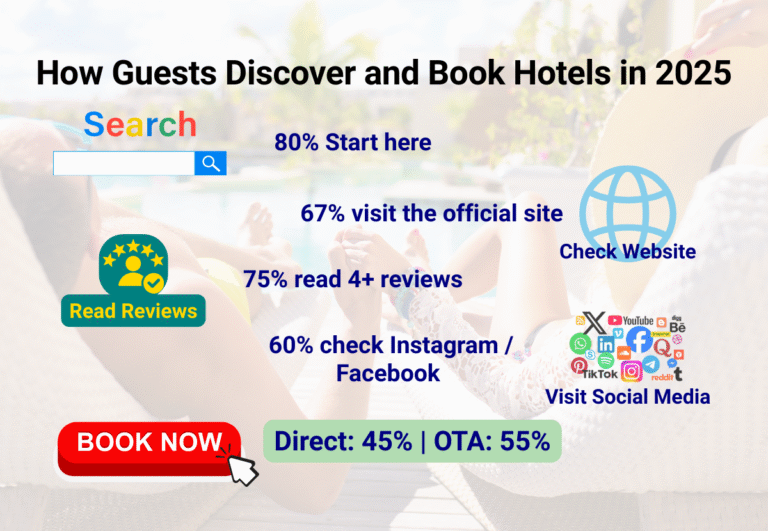
It typically begins with a Google search— for location, type of stay, or even for “best resorts near me.” If your hotel doesn’t rank in those results, you’re already invisible to a majority of potential guests.
The next step is usually a visit to your website or social media page. If the website is outdated, non-mobile-friendly, or doesn’t offer clear information, the guest leaves.
Worse still, if the hotel doesn’t have its website, the guest may never consider booking directly.
Guests also actively look at Google reviews, TripAdvisor, and OTA ratings. Just a few negative or unanswered reviews—or no reviews at all—can influence a guest’s decision.
In today’s review economy, first impressions are digital.
Beyond this, modern guests expect speed, convenience, and transparency. They want to browse photos and reviews, compare rates, and book instantly—preferably through a mobile phone. They also prefer direct interaction with the property for personalized services, better deals, or special requests. If they don’t find a clear way to connect, they move on.
In short, your online presence is your digital front desk. It’s often the first and only chance to impress a potential guest.
A strong digital marketing strategy ensures that your property is not just visible, but also appealing, accessible, and trustworthy—in every stage of the guest’s decision-making process.
Top Pain Areas Faced by Independent Hotels/ Resorts
In today’s competitive hospitality landscape, independent hotels and resorts in India are facing mounting challenges when it comes to establishing a strong digital footprint.
Despite offering personalized experiences and warm hospitality, many of these establishments struggle with online visibility, guest engagement, and direct bookings.
These hurdles often prevent them from achieving steady growth, attracting the right guests, and securing profitable direct bookings.
From outdated websites and poor search rankings to inconsistent social media activity and an over-reliance on OTAs, the digital gaps are holding back growth. These issues not only impact occupancy rates but also chip away at brand identity and profitability.
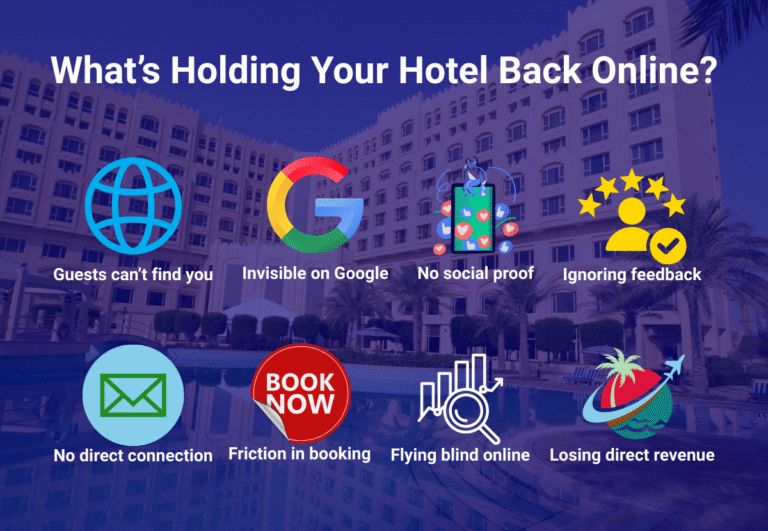
Let’s break down the top 8 pain areas — the core issues that hold back these establishments in the modern travel marketplace.
No Website or Outdated, Non-Mobile-Friendly Sites
Many properties either don’t have a website or still rely on outdated, desktop-only versions that offer a poor user experience. In a mobile-first world, such websites fail to create trust, provide essential information, or support seamless bookings, leading to lost opportunities.
Overdependence on OTAs and No Direct Booking Strategy
Online Travel Agencies (OTAs) are often the primary source of bookings for independent hotels. While they offer reach, an over-reliance leads to high commission payouts, limited control over pricing, and no access to guest data for future marketing.
Low Visibility on Google and Poor SEO
If a hotel’s website or listing isn’t visible on search engines, potential guests won’t find it unless they’re searching through an OTA. Without proper SEO, keyword targeting, and local optimization, even the best properties can remain invisible online.
Weak or Inconsistent Social Media Presence
Many hotels maintain social media accounts but post inconsistently or with generic, uninspiring content. This results in low engagement, weak brand recall, and missed opportunities to connect emotionally with potential guests.
Lack of Email Marketing
Email remains one of the most effective tools for re-engaging past guests and encouraging repeat bookings. Yet, most independent hotels fail to build or use email lists, missing out on a powerful, low-cost marketing channel.
No Analytics or Data Tracking
Without tools like Google Analytics or social media insights, hotel owners operate in the dark. They can’t measure the effectiveness of their marketing efforts or make data-driven decisions to improve their digital strategy.
Neglecting Online Reviews and Guest Feedback
Online reviews heavily influence travel decisions, yet many hotels either ignore them or fail to respond. This lack of engagement can damage credibility, reduce bookings, and signal poor guest service.
Failure to Keep Up With Digital Trends
The digital landscape is constantly evolving—new tools, platforms, and guest expectations emerge regularly. Hotels that don’t adapt risk falling behind competitors who offer faster, more personalized, and more tech-savvy guest experiences.
Each of these challenges presents a clear opportunity. With the right digital marketing strategies, independent hotels and resorts can overcome these obstacles and turn them into strengths.
Digital Marketing Solutions For Hotels and Resorts: From Struggles to Success
In today’s fast-evolving digital world, relying solely on walk-ins or OTAs is no longer sustainable. Smart, cost-effective digital marketing strategies can help hotels and resorts regain control over their visibility, brand, and bookings. Let’s explore how each pain point identified earlier can be solved using targeted digital solutions.
No Website or Outdated, Non-Mobile-Friendly Sites
An outdated or clunky website instantly erodes trust. Guests expect smooth mobile experiences, clear visuals, and real-time booking.
If your site isn’t mobile-friendly or lacks basic features like a gallery or contact form, you’re losing direct bookings.
A responsive, mobile-first website with integrated direct booking capabilities is essential. It should include:
- A modern visual design with high-quality images
- Direct booking engine with payment gateway
- Contact form, WhatsApp link, and Google Maps
- Testimonials and FAQ section
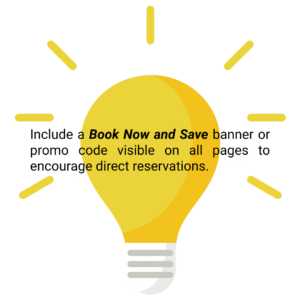
A mid-size resort in coastal Maharashtra had only a Facebook page and relied 100% on OTAs. They created a sleek, mobile-friendly website with a booking widget and WhatsApp CTA.
In two months, direct bookings went up by 30%.
Overdependence on OTAs and No Direct Booking Strategy
While OTAs bring visibility, they eat into your profits with high commission fees and leave you with zero guest data.
Hotels and resorts need to develop a robust direct booking strategy with:
- An SEO-optimized website to reduce dependence on OTAs
- Google Ads to drive traffic directly to your booking engine
- Facebook/Instagram remarketing to target visitors who didn’t complete bookings
- Promo codes for loyal customers or early bird offers
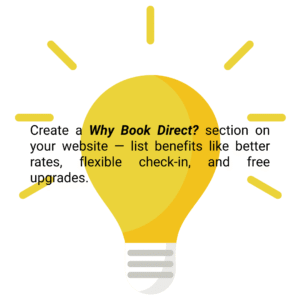
A boutique hotel in Uttarakhand reduced its OTA commission payout by 40% in six months by running targeted Instagram ads with a direct booking link and offering returning guests a discount code via email.
Low Visibility on Google and Poor SEO
If you’re not showing up on Google’s first page when someone searches “hotels near [your location],” you’re practically invisible.
Search engine visibility should be improved through
- Local SEO (optimizing your Google Business Profile with updated info, photos, and reviews)
- Keyword-rich blog posts like “5 Best Beaches Near [Your Hotel]” or “Weekend Getaways from [City]”
- Backlinks from local travel blogs, tourism portals, and directory listings
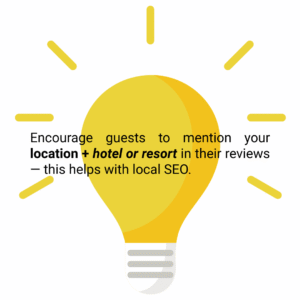
A forest resort near a tiger reserve wasn’t ranking on Google. By updating their Google Business Profile, optimizing their site with local keywords, and creating blog content, we got them into the top 3 search results for key local queries.
Weak or Inconsistent Social Media Presence
If you’re only posting offers once a month, you’re not building a brand. Today’s traveller wants to feel connected and inspired.
Build an engaging and consistent social media strategy:
- Use reels and carousel posts to showcase your rooms, views, food, and experiences
- Share guest testimonials, behind-the-scenes content, and local culture
- Partner with local influencers or travel bloggers for UGC (user-generated content)
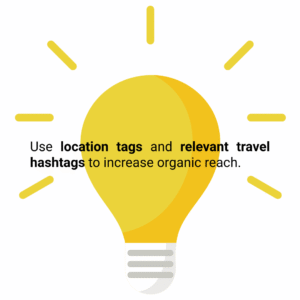
A 3-star heritage hotel in Rajasthan increased its Instagram following by 200% in 3 months by switching from static images to storytelling reels — “A day in the life at the haveli” gained over 40K views.
Lack of Email Marketing
If you’re only posting offers once a month, you’re not building a brand. Today’s traveller wants to feel connected and inspired.
Build an engaging and consistent social media strategy:
- Use reels and carousel posts to showcase your rooms, views, food, and experiences
- Share guest testimonials, behind-the-scenes content, and local culture
- Partner with local influencers or travel bloggers for UGC (user-generated content)
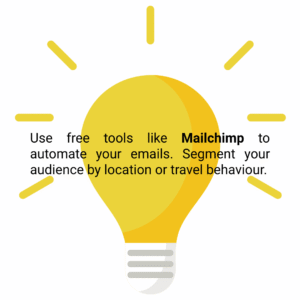
A 3-star heritage hotel in Rajasthan increased its Instagram following by 200% in 3 months by switching from static images to storytelling reels — “A day in the life at the haveli” gained over 40K views.
No Analytics or Data Tracking
If you don’t know where your traffic or bookings are coming from, you’re marketing in the dark.
Set up:
- Google Analytics 4 (track website visits, booking conversion, device use)
- Facebook and Instagram Insights to check ad performance
- Hotjar or Microsoft Clarity for visitor behaviour mapping
- CRM or spreadsheet-based guest data tracker
A hotelier we worked with was running ads but not tracking performance. After integrating Google Analytics and Facebook Pixel, it was learnt that mobile users dropped off at the booking page — they optimized the mobile booking flow and recovered 18% more conversions.
Neglecting Online Reviews and Guest Feedback
Reviews build or break a reputation. One unanswered bad review can hurt your brand.
Create a review management system:
- Automate review requests via WhatsApp or email after checkout
- Thank reviewers promptly, and address negative ones politely
- Use positive reviews as testimonials on the website and social media
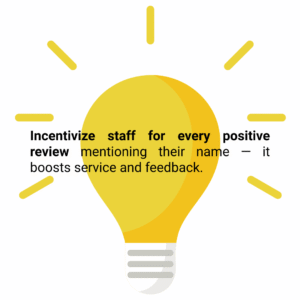
A coastal eco-resort was getting great feedback on-site, but only 2–3 reviews a month online. They created a QR code review system and trained staff to nudge guests — reviews increased 5x in 2 months.
Failure to Keep Up With Digital Trends
Sticking to 2017 digital tactics in 2025 won’t cut it. Trends move fast — and so do your competitors.
Stay relevant by:
- Conducting quarterly audits of your digital assets
- Leveraging current trends (e.g., Reels, voice search, AI chatbots)
- Training staff on basic digital hospitality tools (e.g., Google Business updates, WhatsApp Business)
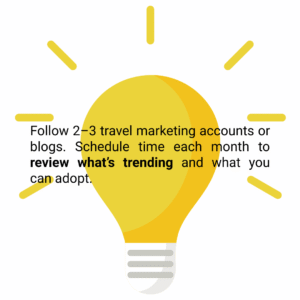
A small backwater property’s digital presence was upgraded with an AI chatbot for WhatsApp inquiries and added drone footage reels on Instagram.
They saw a 50% spike in engagement and faster response times.
Digital marketing isn’t just a “nice-to-have” anymore — it’s a business survival tool. Each pain area has a direct, implementable solution. Whether you’re starting small or scaling up, it’s about progress, not perfection.
Actionable Tips for Hotel Owners (Quick Wins & Digital Roadmap)
Going digital may sound overwhelming, but it doesn’t have to be. Here are simple, low-cost steps every hotel or resort owner can take today to build a solid digital foundation and start attracting more direct bookings.
Quick Wins You Can Implement Immediately
Update Your Google Business Profile
Ensure your contact info, location, photos, and amenities are current. Add keywords to your description and post regular updates.
Create or Refresh Your Instagram Page
Post 3–4 times weekly using high-quality images, reels, and guest stories. Use local hashtags and location tags to boost visibility.
Add a Booking Form or WhatsApp Button on Your Website
A simple booking inquiry form or a clickable WhatsApp chat button helps increase direct inquiries.
Send a Promo Email to Past Guests
Offer a discount or invite them to visit again during an upcoming festival or off-season period.
Your Digital Roadmap: Step-by-Step Guide
- Build a Mobile-Friendly Website with booking capability, gallery, testimonials, and contact info
- List and Optimize on Google Business Profile for local search visibility
- Set Up Social Media Pages (Instagram & Facebook) with regular updates
- Start Collecting Guest Data — emails, phone numbers, feedback
- Run Small Ad Campaigns on Meta (Facebook & Instagram) to promote direct bookings
- Monitor Performance Weekly using free tools like Google Analytics and Instagram Insights
- Request Reviews Consistently from happy guests and display them online
Conclusion: Going Digital is No Longer Optional — It's Essential
The hospitality industry is changing fast, and so are your guests. In a world where most travel decisions begin online, a strong digital presence is not just a growth strategy but a necessity for survival.
The good news? Every challenge discussed in this blog—from lack of a proper website to low visibility, poor guest engagement, and over-reliance on OTAs—is solvable. With the right digital marketing approach, even small and mid-sized hotels and resorts can attract more guests, secure more direct bookings, and build a loyal customer base.
At KarmaClicks Digital, we specialize in helping independent hotel and resort owners set up a complete digital ecosystem—one that includes website design, SEO, social media, content creation, lead generation, and analytics tracking.
Ready to grow your hotel business online? Contact karmaclicksdigital@outlook.com for a free digital audit or to discuss a custom starter package tailored to your property’s needs.
Let’s build a digital presence your guests will trust—and your business will benefit from.
